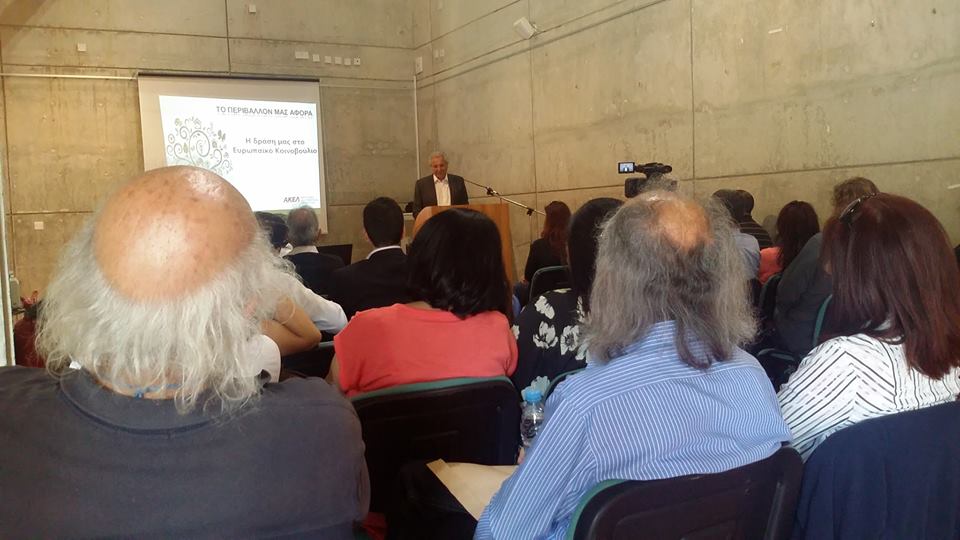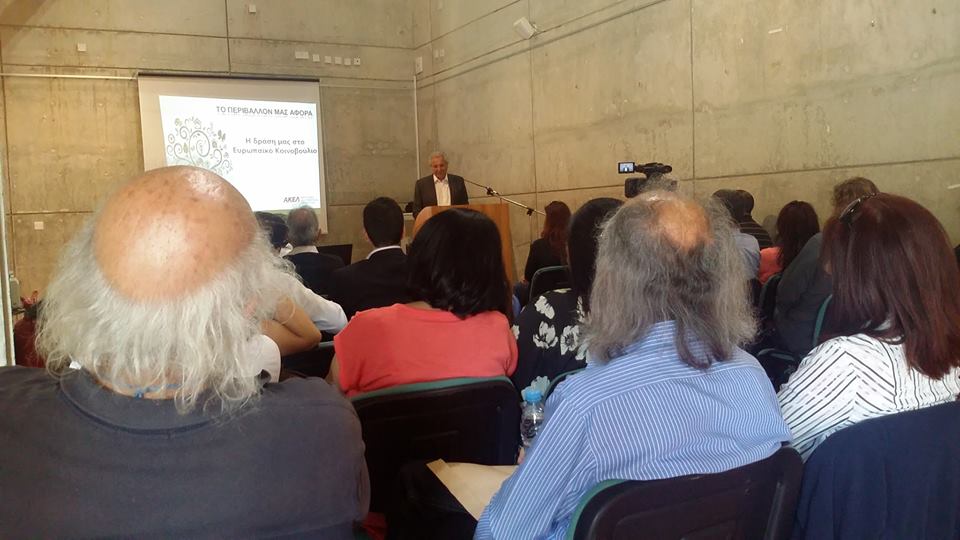
Address of Andros Kyprianou, General Secretary of the C.C. of AKEL, to an open debate with the environmental movements and NGO’s on European environmental issues
AKEL C.C. Press Office, 14th May 2014, Acropolis Park, Nicosia
 On behalf of the C.C. of AKEL, I welcome you all to the discussion organized on the initiative of the Environment Bureau of the C.C. of AKEL on such a timely and important issue, namely the environment. We shall deal mainly with its European dimension. Today’s open discussion reflects our Party’s long-standing interest on environmental and ecological issues. It is a concrete action by AKEL to develop an on-going political dialogue on these issues. Our foremost goal is to find a common ground with the aim of promoting their solution.
On behalf of the C.C. of AKEL, I welcome you all to the discussion organized on the initiative of the Environment Bureau of the C.C. of AKEL on such a timely and important issue, namely the environment. We shall deal mainly with its European dimension. Today’s open discussion reflects our Party’s long-standing interest on environmental and ecological issues. It is a concrete action by AKEL to develop an on-going political dialogue on these issues. Our foremost goal is to find a common ground with the aim of promoting their solution.
Environmental issues and ecology are more and more drawing the attention and concern of the entire planet. This is because they now directly threaten the quality of life in every corner of the earth. The dramatic climate changes and increasing frequency and intensity of extreme weather phenomena, the increase in average global temperatures, rising sea levels and so many other developments are taking place around us every day, are all constantly sending out alarming signals and warnings. Water shortage, deforestation and desertification – phenomena observed strongly in our own country – are all part of the list of environmental problems. Unfortunately this list is continually growing longer.
AKEL considers that the issue of the environmental and ecological crisis is political, economic and social. The life and development of human history relied solely on the management and exploitation of natural resources, both in terms of its survival, as well as the economic and social development of human societies. Since the advent of the industrial era until today, the relations of production were basically based on the reckless exploitation and use of natural resources and the exploitation of labour power, aiming to maximise profit. The main outcome of this approach is the accumulation of capital in the hands of a privileged few. The accumulation of capital is reflected today in the global capitalist economic crisis and at the same time, in the deterioration of global environmental problems. This is also due to the industrial activity and culture imposed both in developed countries and “emerging” economies.
The failures of the most recent Conferences of the United Nations on climate change should make us think and reflect. The failure of the world’s leaders, especially those of the developed countries, to tackle the threat of climate change will have serious impacts and results on peoples and ecosystems. It’s enough to mention that according to scientific research, global warming has caused the heat wave that struck Russia in 2010 that cost the lives of 55,000 people, the floods and landslides that broke out in China during the summer of 2010 caused damage amounting to $18 billion, while floods in Pakistan have caused $ 9.5 billion of damage. 2010 was one of the years that saw the most deadly disasters over the last two decades resulting in the loss of life of almost 297,000 people with more than 207 million people affected. The sharp rise in greenhouse emissions and the predictions for the future are regretfully just the beginning, given that it appears the worst is yet to come.
The overriding question is: Is there a way out of the current environmental crisis that forebodes a nightmarish prospect for our planet? We believe the answer is yes. There are alternative political and technological options to improve the impending environmental crisis. Above all however it needs political will to implement these choices we have to make. The efforts so far undertaken have shown that such a universal problem as the environment cannot be solved in a fragmented way and by applying policies and actions on a small and restricted scale. It can only be solved by implementing policies that have a global dimension and perspective. To achieve this goal we require a lot of pressure and the mass mobilization of societies and the ecological and environmental movement. The demand for an environmentally friendly policy is now accompanied by the demand for peace, security and an end to the unjust socio- economic policies being imposed.
The policies and actions promoted within and outside the European Union have to a large extent a negative impact on the environment. They fail to address the problem at its root since they do not reverse the on-going neoliberal policies. Within the European Parliament itself there is a struggle between the different political philosophies and approaches. The Group of the European United Left/Nordic Green Left, together with AKEL too, set high on their priorities environmental issues and work to combat and stop erroneous policies that drive the environment into the shackles of the free market.
Through our actions in the European Parliament over the previous five year term, AKEL asserted and safeguarded the right of Cyprus to be declared a zone free from genetically modified organisms. Furthermore, we promoted issues relating to the “NATURA 2000” areas in the occupied territories, for the Pentadaktylos mountain range and the Karpasia peninsula by submitting written questions and through our interventions in plenary sessions and parliamentary committees. We argued in favour of a strict Directive to assess the impact of public and private projects on the environment. We expressed our opposition to the emissions trading system, which is not a real solution to the problem of climate change and many other actions.
It is worth pointing out that at the same time when we are in the midst of a period of deep reflection about the very prospect of our planet’s survival until the end even of the 21st century, the international agendas set by the same circles responsible for the current critical situation of our earth, never set the question of changing the system that in fact has caused and continues to exacerbate the problems. The global consensus on the need for a new course for sustainable economies and societies demands above all a change in the non-viable practices.
As AKEL, we assure the Cypriot people that we will continue our efforts to protect the environment, both in Cyprus and in Europe and more specifically in the European Parliament.
Of course, I would like to emphasize that in our country the comprehensive addressing of the issues relating to the environment, indeed like so many others, can only be achieved with the reunification of our country and people.
The struggle to protect the environment is a struggle for the right to life. In such struggles our duty is to take the lead and be in the forefront of the struggles. Today’s debate is a small contribution to this struggle to address the environmental crisis and for a better quality of life in Cyprus and the world.




